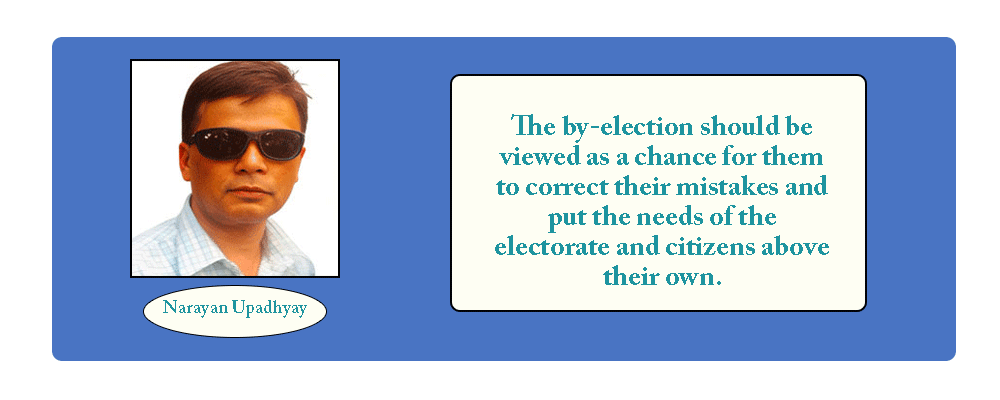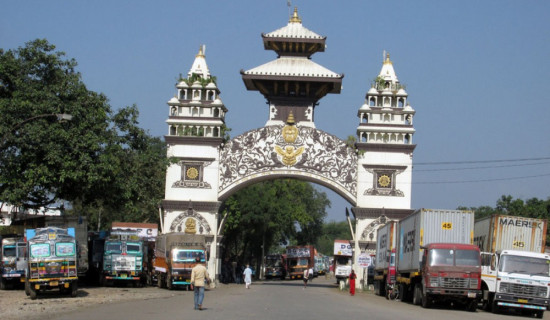- Sunday, 15 February 2026
Key Takeaways For Established Parties
The April 23 by-election results in the Tanahun and Chitwan constituencies have sent shockwaves across Nepal's established political parties. Rabi Lamichhane's Rastriya Swatantra Party (RSP) won by bigger margin beating candidates from the Nepali Congress and the CPN-UML. Both Lamichhane, chair of RSP, and prominent economist Swarnim Wagle easily defeated their closest competitors from the NC and the UML, demonstrating that voters in the two constituencies disregarded the demand of the major parties to support their respective candidates. Despite holding larger political rallies and meetings in these constituencies, the leaders of the ruling alliance and the opposition parties saw their candidates lose.
Many political pundits in Nepal believe that the unexpected outcome should serve as a wake-up call to the political establishment. They also believe that the RSP, riding high on the popularity of its chairperson Lamichhane, may pull off an even bigger upset in the upcoming general elections in 2027. The outcome of the by-election has prompted numerous issues concerning the state of Nepal's politics and the future of the major parties. Political experts cite the rejection of the notion that coalitions between well-established parties will always result in electoral success as one of the most important lessons learned. Lamichhane and Wagle, two RSP candidates, prevailed against rivals from the ruling alliance and the main opposition thanks to the support of voters.
Lamichhane’s popularity
RSP chair Lamichhane received huge support in Chitwan constituency despite the fact that he had been expelled from the legislature due to fraud involving his infamous citizenship and passport scandal and despite the controversy surrounding RSP parliamentarian Dhaka Kumar Shrestha, who was accused of soliciting funds from a well-known health entrepreneur. This shows that the popularity and performance of the individual candidate like Lamichhane, rather than the support of the political party, are more important to the balloters in the Chitwan constituency.
By backing the Nepali Congress' dissident candidate, economist Wagle, in the recent by-election, the electorate of Tanahun intended to teach the party a lesson. He is regarded as an expert in the economy and was involved in writing the NC’s electoral manifesto for the November 2022 general elections. Having served at international agencies on multiple occasions, he had originally planned to run in the elections in November, but the party leadership snubbed him and later prevented him from becoming a presidential advisor. As a result of his frustration, Wagle joined the RSP just before the by-elections, which improved the RSP's standing.
His departure exposed the division among the Nepali Congress's leaders. Electors’ support for Wagle was an indication of their displeasure with the party and that they will not support political syndicates that put their own interests above those of the general populace. To win future elections, parties must unite with the electorate rather than with one another. They must put up candidates who can easily win and have a proven pro-people posture, such as those from the RSP. If established parties wish to compete in the upcoming general election, they must turn the distrust that has been directed at them into trust.
Voters in the by-election were undoubtedly drawn to a party that had strong candidates and reflected their interests. The RSP's success is in part attributable to its ability to relate to voters' issues and strong appeal to them. Established parties must take this as a lesson and put the needs of the people above their own. They must carefully consider the reasons behind the election's debacle and implement the appropriate adjustments. The established parties should use this election as a warning to reevaluate their philosophies and tactics.
Another fundamental fact, nevertheless, needs to be acknowledged: Nepali people frequently change their minds about the same parties they previously opposed. Examples do suggest how some parties' initial victories fade away over time. It seemed as though the entire nation had turned into a Maoist stronghold when the Maoist guerrillas entered mainstream politics. The former rebels did well in the 2008 elections for the Constituent Assembly, establishing their administration. With only 32 members in the HoR as opposed to 89 in the Nepali Congress and 80 in the UML, their current position is weaker.
The once wildly popular CPN-Maoist Centre has fallen out of favour, and it worries that after the forthcoming general elections, it may lose all relevance. This could also occur to the RSP if some sort of controversy breaks out, like the citizenship and passport issues involving Lamichhane and the bribery scandal involving Dhaka Kumar Shrestha, or if the party imitates other parties by distancing itself from people-centred agendas and programmes and keeps engaging in self-serving activities, which would reduce its support and hurt its electoral chances.
People’s agenda
In conclusion, the established parties can easily recover their lost footing if they learn important lessons from their disastrous by-election campaign and address their fundamental flaws, such as their inability to formulate a short- and long-term pro-people agenda and to field qualified candidates with admirable reputations. These parties must recognise that they need to modify their practises in order to stay relevant and engage with the public in this age of social media, when opinions are developed in support of particular parties, people, and groups through persistent programming.
The by-election should be viewed as a chance for them to correct their mistakes and put the needs of the electorate and citizens above their own. If they don't, they run the risk of weakening even more and losing the support of the electorate. For realising this fact, they should not go far but to look at the Maoist Centre, which has continuously lost its popular vote base over years.
(Upadhyay is a former managing editor of this daily.)

















